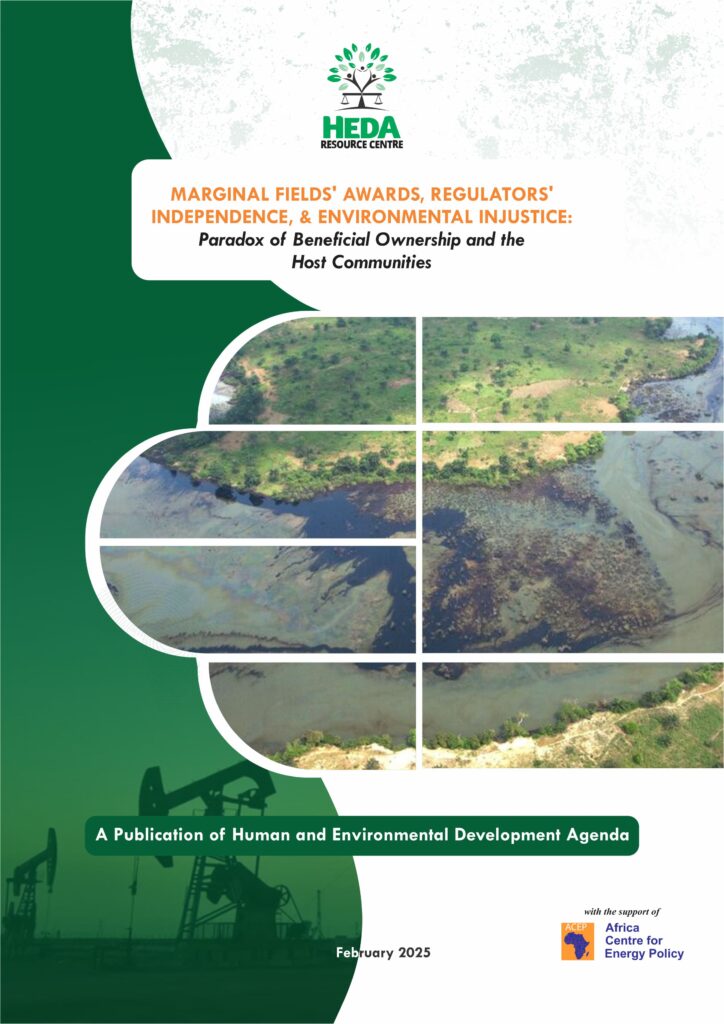Representatives from nine oil-producing communities in the Niger Delta region and the Human and Environmental Development Agenda (HEDA Resource Centre) are pressing for transparency and accountability in the ongoing divestment within the oil and gas industry. The demand arose from a meeting of approximately a hundred groups and communities convened in Port Harcourt last week, where stakeholders vocally called for transparency from both the Nigerian government and the oil corporations involved in the divestment process.
The 35th Anti-Corruption Situation Room (ACSR) workshop organized by Nigeria’s leading anti-corruption group, the Human and Environmental Development Agenda (HEDA) Resource Centre, in collaboration with the National Human Rights Commission (NHRC) and with support from the MacArthur Foundation, the gathering focused on addressing concerns regarding divestment activities in the region.
The divestment initiative, which began in 2010, has gained momentum recently, with oil giant Shell Plc agreeing to sell its onshore oil assets to local companies in a deal worth $1.3 billion. This strategic move by Shell aims to distance itself from the challenging onshore operating environment, characterized by sabotage, communal conflicts, oil theft, and concerns over climate change.
Participants at the event highlighted the prevalence of corruption and human rights abuses in the oil and gas sector, stressing the imperative need for greater transparency throughout the divestment process.
Mr. Olanrewaju Suraju, the chairman of HEDA stated that the purpose of the event was to highlight the importance of community roles in human right protection in the issue of oil divestment. He explained that in the consideration of divestment, the oil companies and the federal government must involve all stakeholders in the discuss noting that
According to him, “Divestment in the Niger Delta must be done in integrity and fairness without excluding the Community people. The stakeholders have the passion coming from their past experience where the International Oil Companies left the communities without proper information.
He expressed sadness about the operations of some International Oil Companies, IOCs operating in Nigerian and the consequences of what most oil bearing communities are going through, therefore called on the public to always be on the watch out to expose any human rights abuses and corruption in any guise that would affect their environment or source of livelihood.
In his presentation, Engr. Gbenga Komolafe, Chief Executive Officer of the Nigerian Upstream Petroleum Regulatory Commission (NUPRC), represented by Dr. Kelechi Ofoegbu, executive commissioner, Corporate Services and Administration, NUPRC, delivered a keynote address focusing on citizens’ rights to a sustainable environment and economic development amid the proposed divestment.
He outlined the commission’s conditions for divestment, including legal requirements, safety measures, and community considerations. He maintained that there is a checklist every divestment must follow before government will approve such divestment, which include financial considerations, health and safety among others.
However, concerns were raised by Mr. Nicholas Hildyard from The CornerHouse, United Kingdom, regarding the financial strength of participating companies, potential breaches of NUPRC rules, and inadequate environmental assessments conducted by Shell Petroleum Development Company (SPDC).
Mrs. Agharese Arase, Director of the National Human Rights Institute (NHRI), emphasized the importance of community involvement in advancing human rights agendas, advocating for the inclusion of women and children in addressing these issues.
Dr. Emem Bridget, representing Ketekbache, highlighted the historical and ongoing exploitation faced by Niger Delta communities, underscoring the adverse effects of pollution on health, livelihoods, and traditional practices.
Indigenous community leaders expressed dissatisfaction with the lack of access to information, constructive engagements, and environmental impact assessments in the divestment process. They demanded full disclosure, consultation with affected communities, and adherence to international conventions on indigenous rights and environmental protection.
The gathering concluded with a resolution urging comprehensive environmental assessments, inclusive decision-making processes, and adherence to international conventions in the ongoing divestment in the Niger Delta region. Participants commended the efforts of HEDA and the MacArthur Foundation in spearheading anti-corruption initiatives in Nigeria.



